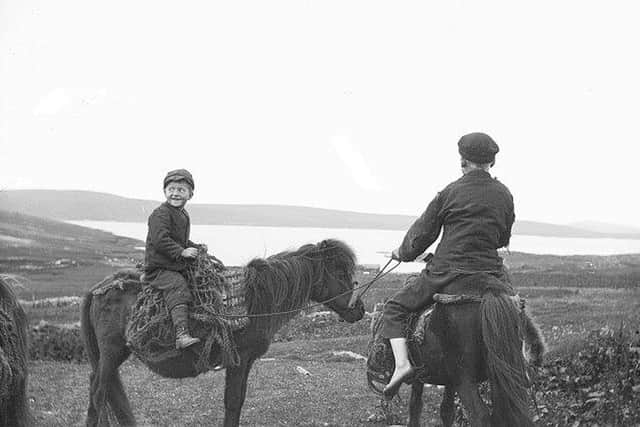Beltane: When May fires burned for three days on a Scottish island for luck
On Shetland the Beltane festival was observed until the mid-19th Century with fires lit across the islands in a ritual designed to conjure good fortune for newly-planted crops.
Fires were stacked by youngsters and, in a game played to mark the occasion, those who let a chunk of burning peat go out would have to play the role of a pack horse.
Advertisement
Hide AdAdvertisement
Hide AdDown on their hands and knees they went, with their back’s stacked with driftwood, seaweed and bits of rope.


Dr Iain Tait, curator at Shetland Museums and Archives, said: “Beltane was a pre-Christian festival and what is interesting in a Shetland context is that most other traditional customs derived from Scandinavia. It is fascinating that this one has closer parallels to Britain and Ireland.
"It took place in the first week of May and in Shetland the central strand of the festival was fire. Young people mostly would stack up peats and the fire would burn for the first three days of May.
"At night, before the fire went out, ash would be heaped on the fire so it would keep glowing through the night.
"I believe the fire was making an offering for a successful harvest in the coming year."
Fire was central to the Beltane festivals of May 1, when darkness was shed and revellers embraced the light of the new season.
Across the country, Beltane fire was considered a great source of purification and healing.
On Shetland, part of the festival included a game played by three youngsters, usually boys, which Dr Tait likened to a “game of dare.”
Advertisement
Hide AdAdvertisement
Hide AdHe added: “The boys would stand together in a close group and one of them would have a pair of fire tongs. They would take a piece of glowing peat and hold it aloft. They had to recite a verse and pass it on to the next one, who would then recite the verse again and pass the peat on again one they had finished the verse.
The verse was recorded in the islands in the 19th Century. It warned against letting the fire go out. Those who did faced the penalty of being a burden carried.
Dr Tait added: “Whoever was holding onto the burning peat when it went out had to go down on his hands and knees then debris, such as dried up seaweed, driftwood and bits of seaweed piled up on his back. This is fitting for Shetland as packhorses were used from medieval times.
"I guess what they are really saying is that because you have failed in your task, you have to take on a burdonsome chore. It was like a game of dare, I suppose.”
Dr Tait said the Beltane tradition fitted into customs observed by Shetlanders to insure good luck, fertility and productivity for the agricultural year.
Tasks such as making butter were also ‘protected’ by rituals, such as dropping a silver coin into a churn.
Those sowing the fields would put the seeds into a hand-woven basket alongside an egg.
Dr Tait said: “The egg always had to stay there as it represented the potential for fertility and growth.”
A message from the Editor:
Thank you for reading this article. We're more reliant on your support than ever as the shift in consumer habits brought about by Coronavirus impacts our advertisers.
If you haven't already, please consider supporting our trusted, fact-checked journalism by taking out a digital subscription.
Comments
Want to join the conversation? Please or to comment on this article.
